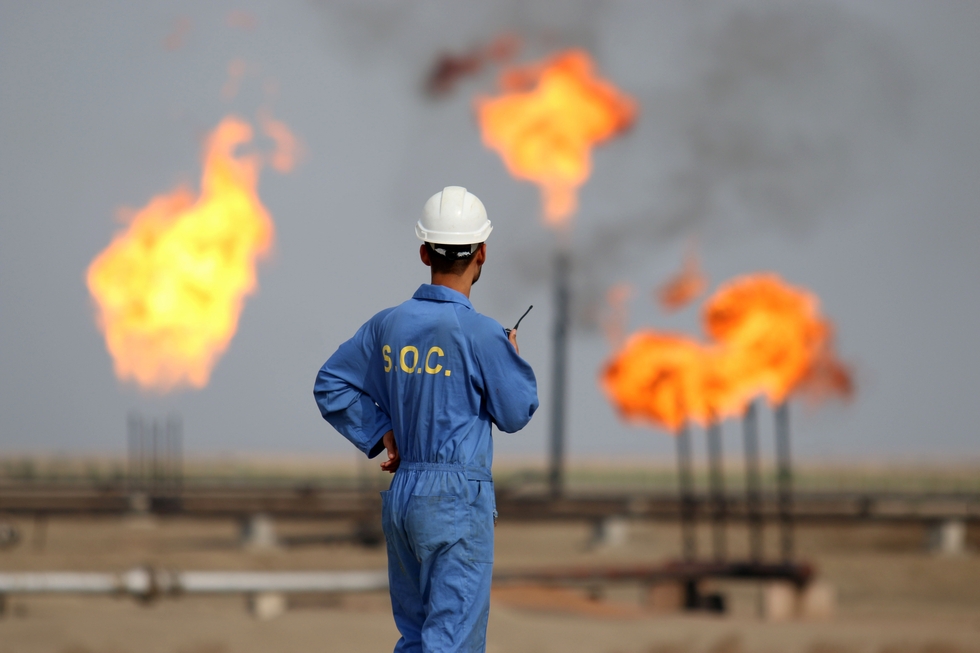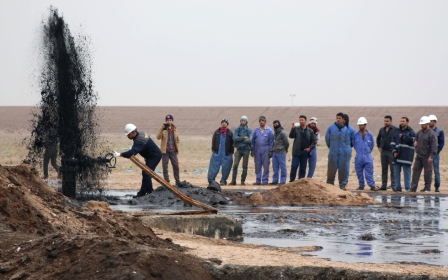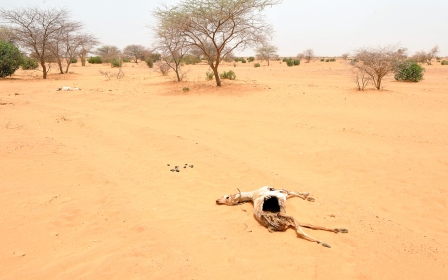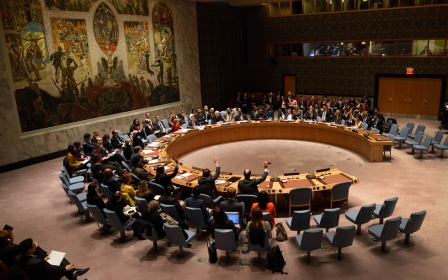Terror, climate chaos, financial crisis are the costs of ‘doing business’

Fifteen years into the 21st century, humanity has made little progress in addressing major threats to civilisation. In fact, on terrorism, climate change and the economy, we’re not making progress at all, but making things worse.
The "war on terror" has been waged for 14 years since 9/11, but far from terror being defeated, it has metastasised into a regional quasi-state occupying parts of Iraq and Syria.
Despite the much-lauded "binding" climate accord agreed in Paris, the governments most responsible for carbon emissions are still avoiding the reductions necessary to prevent us breaching crucial tipping points into dangerous climate change.
Governments have tried every neoliberal trick in the book to kick-start prosperity, but the legacy of the 2008 banking collapse lives on through tepid growth, astronomical global debt even higher than pre-crash levels, and the perpetual risk of another financial crisis.
At first glance, these failures appear unrelated.
In reality, ineffective hysteria in fighting terror, chronic inertia in tackling climate change, and impotence in the face of looming capitalist meltdown are part of the same structural problem: our civilisational paradigm.
Mind the gaps
Thanks to scientific and technological advances, information has never been so voluminous, and so accessible, to so many people.
But the epistemological gap between our perceptions of the world and how we are affecting it remains as wide as ever.
Sometimes, the gap is manufactured for political convenience. Senior US military commanders, for instance, have deliberately massaged intelligence to promote an image of victory in the war on the Islamic State (IS) – fabrications reminiscent of intelligence manipulation on weapons of mass destruction during the 2003 Iraq War.
The gap is also related to deep-rooted geopolitical structures integral to the way the West interacts with the Muslim world. At the forefront of the US-led war on IS is a coalition of regional powers who over the past half-decade had siphoned arms and funds to the very militant groups in Syria that coalesced into IS.
Declassified intelligence documents reveal that despite knowing full well that their own allies – the Gulf states and Turkey – were empowering the most extremist Syrian rebel factions, Western governments continued to support them.
No wonder Alain Chouet, former head of the Security Intelligence Service of the French Directorate-General for External Security (DGSE), has described the "war on terror" as a "sham" concealing an ongoing "military alliance" between "Western governments and the financial sponsors of jihad … [W]e remain allies with those who have sponsored this terrorism for the last 30 years."
Addicted to oil
A core reason for this self-defeating alliance is oil addiction. Since the Second World War, the US has fostered alliances with autocratic regimes across the Muslim world to access regional fossil fuel energy sources deemed critical for the very survival of global capitalism.
US Central Command (CENTCOM) documents from the 1990s until today justify a permanent US combat presence in the Gulf to defend "US and free-world interests," especially "critical economic interests," which include guaranteeing "the free flow of oil at stable and reasonable prices" along with "freedom of navigation and access to commercial markets".
This thinking did not change after 9/11.
A 2013 CENTCOM document promises that “oil and energy resources that fuel the global economy” will “keep US attention anchored in this region”.
Alliances with key Gulf regimes to ratify US military access, free trade, and arms sales are pivotal to this strategy, despite them being brutal dictatorships sponsoring the very forces the West is purportedly fighting.
As General Colin Powell said after al-Qaeda’s 1998 attacks on the US embassies in Kenya and Tanzania, terrorism “is the cost of doing business” in today’s world.
Climate chaos
But terror is not the only cost.
Another is climate change. Over the past few centuries, the abundance of cheap fossil fuels has enabled exponential economic growth since the industrial revolution.
Yet fossil fuel emissions are now overwhelming the planet’s natural balance with an ever-increasing quantity of atmospheric carbon, contributing to global warming, and destabilising eco-systems.
According to the UN’s Intergovernmental Panel on Climate Change (IPCC), the current rate of fossil fuel emissions heralds a worst-case scenario of global average temperatures rising by around four to five degrees Celsius by 2100.
Most scientists agree this would render the Earth largely uninhabitable. “If global warming approaches 3C by the end of the century,” writes former NASA chief climate scientist James Hansen, "it is estimated that 21-52% of the species on Earth will be committed to extinction."
Our business-as-usual trajectory means we are already on track to hit the worst-case scenario, even if countries comply with national pledges to slash emissions.
The worst case may also not even be the worst case. The very process of obtaining a consensus means IPCC forecasts are too conservative and consistently underestimate the severity of global warming.
To make matters worse, the world’s major fossil fuel emitters – especially the US, China and Saudi Arabia – have repeatedly pressured the IPCC to “dilute” its landmark "Summary for Policymakers" reports, to minimise policies that could undermine fossil fuel interests.
Yet as even Bank of England governor Mark Carney acknowledges, avoiding dangerous climate change requires the "vast majority" of the world’s oil, gas and coal reserves to be left in the ground. In which case, fossil fuel majors are sitting on defunct "stranded assets" that put investors and insurers at major financial risk.
End of oil, limits to growth
Fossil fuels are implicated in global financial woe in a more direct respect. Professor James Hamilton, an economist at the University of California, San Diego, has shown that oil price spikes helped trigger the consumer defaults behind the unraveling of mortgage debt, leading to the 2008 banking collapse.
The oil spikes had been triggered by the peak and plateau of world conventional oil production around 2005. Since then, most new production has come from more expensive unconventional oil and gas sources, such as shale gas and tar sands.
Production costs for unconventional sources are far higher than for cheap crude. But the rapid depletion rate for shale gas wells has driven high drill rates, fuelling a gas glut. The resulting oversupply has helped lower the market price to a degree that threatens profitability for the entire industry.
This shift away from cheap, easy fossil fuels to expensive, difficult-to-extract energy is the biggest elephant in the room when it comes to the economic slowdown.
Conventional economists, who largely failed to anticipate the 2008 crash, still fail to understand the economy’s embeddedness in environmental and energy systems. They do not grasp that persistent slow growth is symptomatic of the economy’s intensifying overshoot of the natural limits of those systems.
No amount of quantitative easing, deregulation, and austerity can address the endless-growth model’s dependence on unlimited exploitation of planetary resources – and the latter’s accelerating depletion.
Arab spring, Arab winter
These converging crises – climate-induced droughts, collapsing agriculture, peak oil, the decline of state revenues, accelerating debt and inequality under extreme financial deregulation and liberalisation - combined with reactionary state repression to maintain "order" have helped induce the string of state failures behind escalating ethnic, sectarian and political unrest across the Middle East.
In countries like Egypt, Syria, Iraq, Yemen and beyond, civil unrest was triggered or exacerbated by food price hikes.
Those in turn were triggered by unprecedented extreme weather events in food-basket regions, rapid depletion of these countries’ conventional oil sources, the consequent haemorrhage of state revenues, and the inability of authoritarian states to contain popular resentments any longer.
What happens when, over the next 15 years, Saudi Arabia’s oil export capacity declines to zero? When US shale production peaks after 2020? When climate change increasingly disrupts major food producing regions?
We’re all monsters now
As the economy teeters on the brink of the next crisis, as climate change intensifies, as planetary resources deplete and rates of extinction accelerate, as violent conflict and terrorism proliferate, the response of world leaders has been denial, business-as-usual, and too little, too late.
We are at war with surface-symptoms: obsessed with throwing bombs at terrorists forged from a system that incubates both bombs and terrorists.
That is precisely because the epistemological failure to recognise the inherent interconnections of these global crises is, itself, symptomatic of the same crises.
The fragmentation in our epistemic approach – our vision of the world – reflects the fragmentation we create in the world.
Based on an inherently limited diagnosis that refuses to concede the complicity of business-as-usual in generating these crises, industrial civilisation’s approach is to shore-up the existing system of endless growth, premised on fossil fuel dependence.
It is no coincidence that the "war on terror" is being led by a coalition of the world’s major industrial consumers, fossil fuel producers and carbon emitters – in the name of defending "civilisation".
It is no coincidence that all the areas of military engagement to fight terror, including the latest in Syria, happen to contain the bulk of the world’s remaining strategic energy resources.
But the projection of a civilisational divide props up the comforting delusion that the problem is not with "our civilisation" – but with "Them": "Them" terrorists are evil, unfathomable monsters who appear out of the blue due solely to backward beliefs, and must therefore be destroyed by "Our" civilisation.
This childish Star Wars-esque narrative obscures the fact that backward ideologies are becoming attractive in the context of state failures triggered by business-as-usual hitting biophysical limits.
The techno-narcissism of predatory neoliberal capitalism is locked into an endless war with the bastard monster of its own creation, Islamist militant supremacism.
Both ideologies believe they represent "civilisation". Both are merely fractured mirror images, reflecting a deeper Crisis of Civilisation.
While these two barbarisms fight each other in the name of "civilisation," it is up to people everywhere of all faiths and none to plant the seeds of the post-capitalist alternative.
- Nafeez Ahmed PhD is an investigative journalist, international security scholar and bestselling author who tracks what he calls the 'crisis of civilization.' He is a winner of the Project Censored Award for Outstanding Investigative Journalism for his Guardian reporting on the intersection of global ecological, energy and economic crises with regional geopolitics and conflicts. He has also written for The Independent, Sydney Morning Herald, The Age, The Scotsman, Foreign Policy, The Atlantic, Quartz, Prospect, New Statesman, Le Monde diplomatique, New Internationalist. His work on the root causes and covert operations linked to international terrorism officially contributed to the 9/11 Commission and the 7/7 Coroner’s Inquest.
The views expressed in this article belong to the author and do not necessarily reflect the editorial policy of Middle East Eye.
Photo: An Iraqi labourer works at an oil refinery in the southern town Nasiriyah on 30 October, 2015 (AFP).
New MEE newsletter: Jerusalem Dispatch
Sign up to get the latest insights and analysis on Israel-Palestine, alongside Turkey Unpacked and other MEE newsletters
Middle East Eye delivers independent and unrivalled coverage and analysis of the Middle East, North Africa and beyond. To learn more about republishing this content and the associated fees, please fill out this form. More about MEE can be found here.





